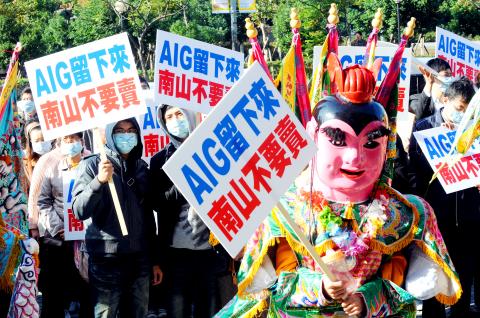Scores of Nan Shan Life Insurance Co (南山人壽) employees and policyholders yesterday staged a demonstration outside the Financial Supervisory Commission (FSC), asking the regulator to help persuade the US parent, American International Group Inc (AIG), to retain its Taiwan unit.
The petition came amid local media reports that AIG officials are meeting potential buyers in Hong Kong to discuss plans to sell a 97.57 percent stake in Nan Shan for the second time after Taiwan thwarted the first attempt on Aug. 31.
The cash-strapped US insurance giant is expected to pick a buyer by the end of this year to pay down debts to the US government.

PHOTO: LO PEI-DER, TAIPEI TIMES
“AIG, Please Stay, Don’t Sell Nan Shan,” the demonstrators chanted before handing a petition to FSC insurance official Wu Chung-chuan (吳崇權).
Lawrence Lee (李勇助), a Nan Shan sales agent who led the petition, voiced concern the planned sale would compromise the rights of almost 40,000 employees and 4 million policyholders.
The nation’s three largest financial groups, Cathay Financial Holding Co (國泰金控), Fubon Financial Holding Co (富邦金控) and Chinatrust Financial Holding Co (中信金控) have all expressed interest in acquiring Nan Shan.
A Taiwanese consortium led by Ruentex Group (潤泰集團) also made known its intent to buy the insurer by teaming up with footwear products maker Pou Chen Corp (寶成工業), while Primus Financial Holdings Ltd (博智金融), the previous Hong Kong winning bidder, reportedly is making a comeback bid by joining forces with Goldsun Development & Construction Co (國產實業) of Taiwan.
Lee said he and colleagues may lose their jobs if any of the three Taiwanese financial services providers wins Nan Shan because they will implement restructuring measures and rely on their banking arms to sell policies rather than sales agents.
The demonstrators yesterday also questioned Ruentex Group chairman Samuel Yin’s (尹衍樑) sincerity in running an insurance company, saying he had twice sold his stake in an insurance company to gain profits. Yin reportedly offered the highest bid of NT$90 billion (US$2.95 billion) for Nan Shan, higher than the previous winning bid of US$2.15 billion offered by a Hong Kong consortium last year, the Chinese-language Economic Daily News reported.
The newspaper said Chinatrust Financial offered NT$75 billion, and the Commercial Times reported that Cathay and Fubon put in bids of about US$2.1 billion and US$2.5 billion, respectively.
None of companies were available for comment on the figures or talks with AIG in Hong Kong.
AIG reportedly prefers Ruentex out of price concerns or Primus in light of close ties, according to the Economic Daily News, adding that AIG’s legal executive Andrew Borodach has arrived in Hong Kong to meet with potential bidders.
Lee and Nan Shan employees urged FSC to review the bidders’ qualifications, as the two do not have insurance -operation -experience or long-term commitment.
The regulator has said the buyer must also demonstrate capital increase capability and comply with Taiwanese rules forbidding Chinese capital.

SEEKING CLARITY: Washington should not adopt measures that create uncertainties for ‘existing semiconductor investments,’ TSMC said referring to its US$165 billion in the US Taiwan Semiconductor Manufacturing Co (TSMC, 台積電) told the US that any future tariffs on Taiwanese semiconductors could reduce demand for chips and derail its pledge to increase its investment in Arizona. “New import restrictions could jeopardize current US leadership in the competitive technology industry and create uncertainties for many committed semiconductor capital projects in the US, including TSMC Arizona’s significant investment plan in Phoenix,” the chipmaker wrote in a letter to the US Department of Commerce. TSMC issued the warning in response to a solicitation for comments by the department on a possible tariff on semiconductor imports by US President Donald Trump’s

The government has launched a three-pronged strategy to attract local and international talent, aiming to position Taiwan as a new global hub following Nvidia Corp’s announcement that it has chosen Taipei as the site of its Taiwan headquarters. Nvidia cofounder and CEO Jensen Huang (黃仁勳) on Monday last week announced during his keynote speech at the Computex trade show in Taipei that the Nvidia Constellation, the company’s planned Taiwan headquarters, would be located in the Beitou-Shilin Technology Park (北投士林科技園區) in Taipei. Huang’s decision to establish a base in Taiwan is “primarily due to Taiwan’s talent pool and its strength in the semiconductor

An earnings report from semiconductor giant and artificial intelligence (AI) bellwether Nvidia Corp takes center stage for Wall Street this week, as stocks hit a speed bump of worries over US federal deficits driving up Treasury yields. US equities pulled back last week after a torrid rally, as investors turned their attention to tax and spending legislation poised to swell the US government’s US$36 trillion in debt. Long-dated US Treasury yields rose amid the fiscal worries, with the 30-year yield topping 5 percent and hitting its highest level since late 2023. Stocks were dealt another blow on Friday when US President Donald

UNCERTAINTY: Investors remain worried that trade negotiations with Washington could go poorly, given Trump’s inconsistency on tariffs in his second term, experts said The consumer confidence index this month fell for a ninth consecutive month to its lowest level in 13 months, as global trade uncertainties and tariff risks cloud Taiwan’s economic outlook, a survey released yesterday by National Central University found. The biggest decline came from the timing for stock investments, which plunged 11.82 points to 26.82, underscoring bleak investor confidence, it said. “Although the TAIEX reclaimed the 21,000-point mark after the US and China agreed to bury the hatchet for 90 days, investors remain worried that the situation would turn sour later,” said Dachrahn Wu (吳大任), director of the university’s Research Center for